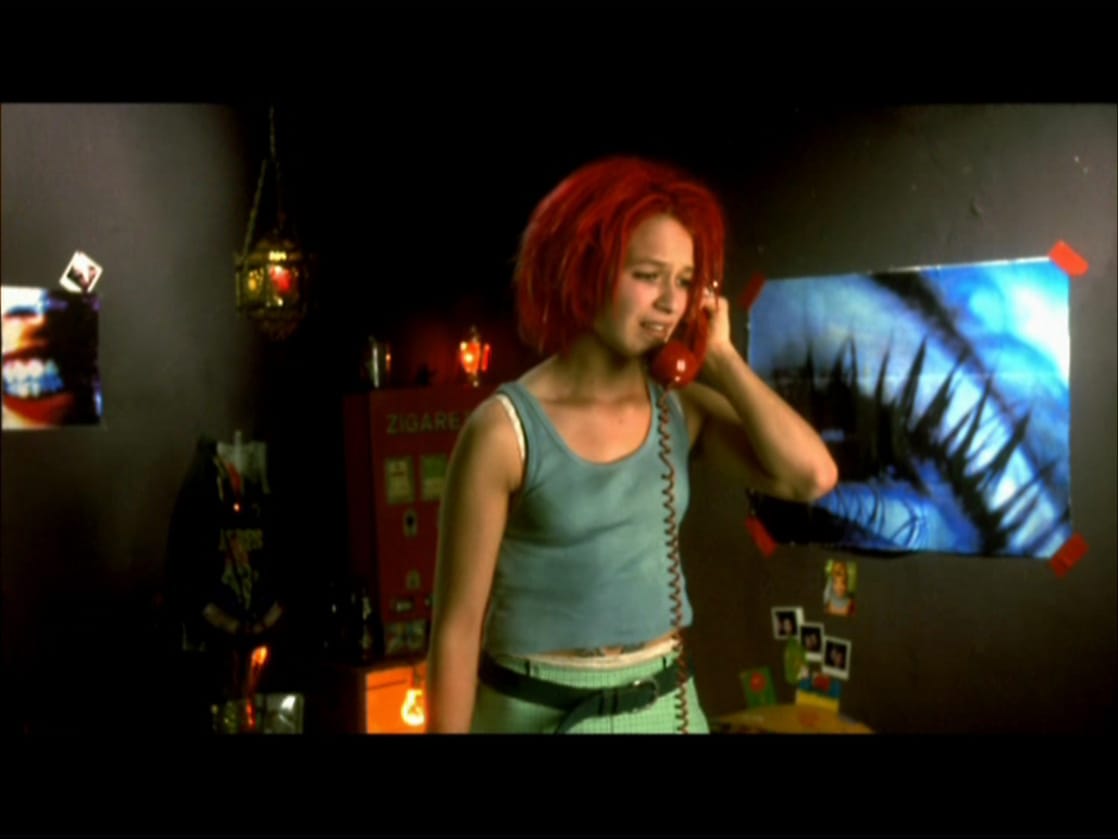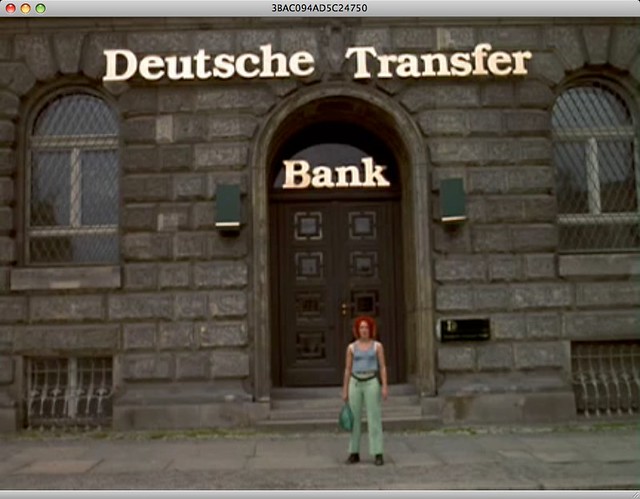This week marks our last and largest blog. To me, it is really bitter sweet. If I am being honest, this weeks’ screening was one of my favorites. The reading on “Run Lola Run” really cemented the movie for me and gave me a deeper understanding of this film. Many critics point to Franka’s “mythic charisma” as magnetic quality that is very much the reason for the film’s success. I agree with this; however, I also agree with the critics that look at the films “Germanness” applauding its use of time and chance and their philosophical implementations. I think that the use of chance and a “re-do” really makes this whole movie become dream-like in the sense that everyone has moments that they wish to go back and do differently.

My favorite part of the “re-do” is the way they captured it. It feels much more like art in motion than just a blunt selfish series of events. Lola tried to do the most efficient thing to save Manni each time she was granted the chance to do so. When Barbara Kosta begins her summary of the film, I was drawn to her observations of the heavy presence of clocks, and the filmmaker’s embrace of the “pop” culture that as she wrote “was the key to the present.” I failed to key on to the rebellious elements in this film, though as Ms. Kosta points out, “Lola’s” scream was very “non-conformist” and in fact, rebellious.

The editing throughout this film caught my attention immediately, but I couldn’t have put it any better once again than Barbara, as she writes “the fast pace editing coupled with Lola’s resiliency” created a new identity for the “post-wall” Germany.
One element to this film that I looked back on as amusing is the fact that Lola’s moped was stolen. I kept thinking that the outcome for many of these events would have been totally different, had she still had her moped. Although I think this portion of the story would have changed everything, I don’t believe that it would have been for the best. The whole theme running through this piece of cinema is Lola’s undying determination.
Lola never ran any slower (even though a lot of the clips were duplicated). She always pushed herself to the limit in her attempts to gather the 100,000 marks and save Manni’s life. Her actions were always as motivated as the first time she got the call from Manni telling her that he needed her and the money by noon, or he would be killed.
The funniest part of this entire film in my opinion was when Lola decided to rob the bank that her father worked for (well step father). When she finally exits the bank with all 100,000 marks in a garbage bag, she is greeted by what seems to be the entire city’s police force. At first, I thought “well she’s done for”, but when they all said, “get out of the way, you don’t want to get killed do you?” I lost it in my seat. The police officers had their robber in their sights, and they willingly helped her escape.

My thoughts on this class over the last semester are primarily gratitude. If my advisor hadn’t given this course to me as an option to fill my last required elective, I don’t think that I would have ever taken it. to be frank, this course has changed the way I will look at cinema in any context, forever. We have covered so many eras in film history, and that has made it so easy to fall in love with each and every decade. Knowing that we’d only be able to study each one for one week really made me delve into each era as we came upon it, and really try to digest what caused it, the people that were involved, and what would come out of it.
The week we covered American International Pictures was my favorite. The exploitation era in my opinion brought us some of the most memorable films and titles that will certainly withstand the test of time.
The way that the Paramount decision opened a door for AIP and many other small studios to put out movies that the big 5 had been blocking for years. For the first time in history, small studios became a big deal, and were able to grab their share of Hollywood.
The most influential person I encountered during this class was hands down, Roger Corman. When Professor Schlegel first talked about Roger, I knew he would become a figure that I looked forward to learning about. I could not have been more right in looking forward to our continuing interaction with him and his films. I was astonished at the work that Corman was able to produce with the budget he worked with, and the cooperation of all the moving parts that come with making a movie.
Another trait of Corman’s that I was especially impressed with was the impact that he had on people. Nearly everyone who worked under Corman and was Corman trained, rose to the top of whatever field they decided to enter after their time with Corman came to an end.
One of my favorite things in this class, was the presentation that we all gave in groups of four. Being able to choose a movie and present its contents to the class was really fun, and something I’ll remember for a long time. We all were able to dissect our films with the knowledge we had acquired from the weeks prior. I have always appreciated “Pit and the Pendulum,” but during the process of researching and re-watching the movie, I grew to understand elements of it that I had simply missed before.
With the completion of this class, I know that without a doubt that every movie I go to see from hence forward, I possess more knowledge, and frankly power. I now have the power and knowledge to look at films through so many lenses that I had not been privy to before. I fully appreciate this opportunity, and the knowledge that has been bestowed upon me.

Covering AIP was also one of my favorite weeks. I’ve always loved B-Movie culture and even though it’s not something that you really think about, the process behind making them was really interesting to me. I love that it was such a shoddy operation though, that really got me. I thought it was hilarious they were able to compete with big pictures with these tiny little budgets. I’m glad you liked the class, I had a great time too!
LikeLike